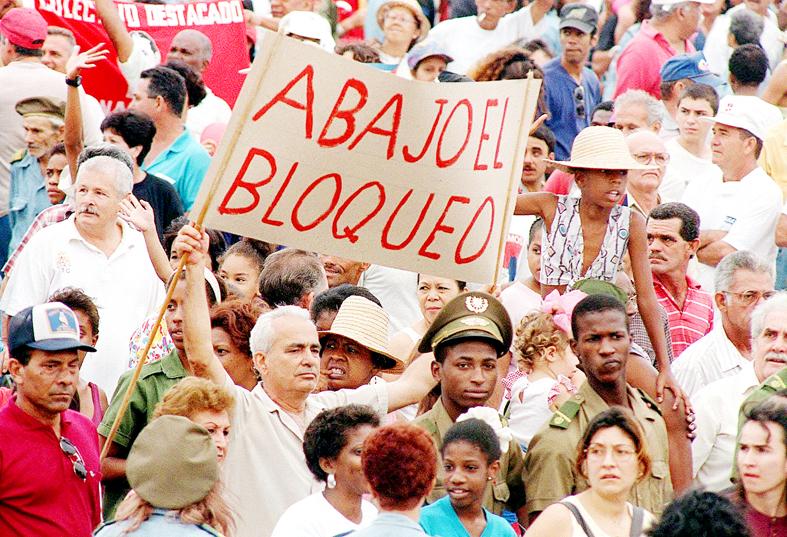Cuba yesterday marked 60 years under a US economic blockade that has deeply affected the communist nation’s fortunes and shows no signs of being lifted.
Decreed by US president John F. Kennedy on Feb. 3, 1962, the embargo on all bilateral trade came into effect four days later.
Its purpose, was to reduce the threat posed by the island nation’s “alignment with the communist powers,” Kennedy’s executive order said.

Photo: AFP
Despite failing to force a change in tack from Havana since then, the sanctions remain in place six decades later, and are blamed by Cuban authorities for damage to the country’s economy amounting to about US$150 billion.
Cuba is experiencing its worst economic crisis in 30 years, with inflation at 70 percent and a severe shortage of food and medicines as the COVID-19 pandemic dealt a hefty blow to a key source of income: tourism.
Long lines for essential goods are common, as food imports have been slashed due to dwindling government reserves.
Havana blames the sanctions for all the country’s woes.
The message that “the embargo is a virus too” has been hammered home by authorities for months, as they organize caravans of cars, bikes and motorcycles to crisscross the nation and denounce the sanctions.
Detractors say inefficiencies and structural problems in the economy controlled by the one-party state are also to blame.
“The real blockade was imposed by the Cuban state,” said advocate Rosa Maria Paya of lobby group Cubadecide, which she directs from exile.
The embargo would only be lifted, she believes, through “a transition to representative democracy.”
Cuba has little productive capacity and relies on imports for about 80 percent of its food needs.
A monetary reform launched a year ago to try and alleviate pressures on Cubans brought about a significant wage increase in a country where most workers are employed by the government, but further fueled price inflation.
Since 2000, food has been excluded from the US blockade, and between 2015 and 2000, Cuba imported about US$1.5 billion worth of food from its neighbor.
The purchases have to be paid in cash and upfront, which are onerous conditions for a country with limited reserves.
Former US secretary of commerce Carlos Gutierrez, who is Cuban-American, said the embargo has proven to be “counterproductive.”
“Absolutely nothing has been obtained from Havana” in response, he said.
Instead, Cuba has looked to US rivals such as China and Russia for support.
Two weeks ago, Cuban President Miguel Diaz-Canel and Russian President Vladimir Putin discussed “strategic partnership” in a telephone call.
Russian Deputy Minister of Foreign Affairs Sergei Ryabkov said that Moscow would not rule out a military deployment to Cuba — just a few hundred kilometers from Miami, Florida — if tensions with Washington over ex-Soviet state Ukraine escalated.

MONEY GRAB: People were rushing to collect bills scattered on the ground after the plane transporting money crashed, which an official said hindered rescue efforts A cargo plane carrying money on Friday crashed near Bolivia’s capital, damaging about a dozen vehicles on highway, scattering bills on the ground and leaving at least 15 people dead and others injured, an official said. Bolivian Minister of Defense Marcelo Salinas said the Hercules C-130 plane was transporting newly printed Bolivian currency when it “landed and veered off the runway” at an airport in El Alto, a city adjacent to La Paz, before ending up in a nearby field. Firefighters managed to put out the flames that engulfed the aircraft. Fire chief Pavel Tovar said at least 15 people died, but

South Korea would soon no longer be one of the few countries where Google Maps does not work properly, after its security-conscious government reversed a two-decade stance to approve the export of high-precision map data to overseas servers. The approval was made “on the condition that strict security requirements are met,” the South Korean Ministry of Land, Infrastructure and Transport said. Those conditions include blurring military and other sensitive security-related facilities, as well as restricting longitude and latitude coordinates for South Korean territory on products such as Google Maps and Google Earth, it said. The decision is expected to hurt Naver and Kakao

THE TRAGEDY OF PUNCH: Footage of the seven-month-old Japanese macaque has gone viral online after he was rejected by his mother and formed a bond with a soft toy A baby monkey in Japan has captured hearts around the world after videos of him being bullied by other monkeys and rejected by his mother went viral last week. Punch, a Japanese macaque, was born in July last year at Ichikawa City Zoo. He has drawn international attention after zookeepers gave him a stuffed orangutan toy after he was abandoned by his mother. Without maternal guidance to help him integrate, Punch has turned to the toy for comfort. He has been filmed multiple times being dragged and chased by older Japanese macaques inside the enclosure. Early clips showed him wandering alone with

Australian Prime Minister Anthony Albanese yesterday said he did not take his security for granted, after he was evacuated from his residence for several hours following a bomb threat sent to a Chinese dance group. Albanese was evacuated from his Canberra residence late on Tuesday following the threat, and returned a few hours later after nothing suspicious was found. The bomb scare was among several e-mails threatening Albanese sent to a representative of Shen Yun, a classical Chinese dance troupe banned in China that is due to perform in Australia this month, a spokesperson for the group said in a statement. The e-mail